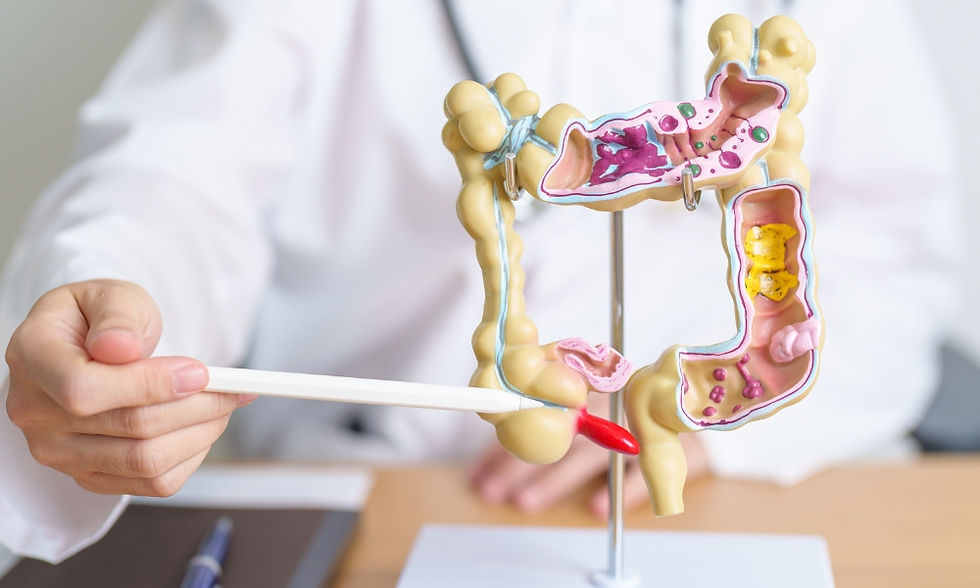Peppermint for Digestive Comfort
- Herbs around us
- Sep 22, 2025
- 3 min read
Updated: Oct 1, 2025
Peppermint has been celebrated for centuries as both a refreshing culinary herb and a trusted natural remedy. Known scientifically as Mentha × piperita, peppermint is a hybrid of spearmint and watermint. Today, it is among the most searched and widely used botanicals for digestive support. Whether sipped as peppermint tea, taken as peppermint capsules, or applied in diluted peppermint oil, this versatile herb offers benefits recognized across continents. For individuals seeking natural ways to ease indigestion, bloating, or irritable bowel discomfort, peppermint remains a global ally.

What Makes Peppermint Effective for Digestion
The power of peppermint lies in its high content of menthol and menthone, active compounds found in its essential oil. These substances exert antispasmodic effects, meaning they relax the muscles of the gastrointestinal tract. This relaxation can ease cramping, reduce bloating, and help gas pass more comfortably.
Modern research supports what traditional medicine has long observed. Clinical studies show that peppermint oil capsules can significantly reduce symptoms of irritable bowel syndrome (IBS), making peppermint one of the few herbal remedies endorsed by gastroenterologists. Peppermint tea, while milder, also provides soothing relief for occasional indigestion and post-meal discomfort.
Forms of Peppermint for Digestive Support
Peppermint is available in multiple formats, each with unique benefits and global popularity.
Peppermint tea: A gentle, widely consumed herbal tea that aids digestion, reduces bloating, and freshens breath.
Peppermint oil capsules: Enteric-coated capsules release oil in the intestines, offering targeted relief for IBS and cramping.
Peppermint extract: Often used in supplements or liquid drops for flexible dosing.
Peppermint leaves: Fresh or dried leaves can be brewed or added to food for both flavor and digestive support.
Peppermint supplements: Pills or powders that combine peppermint with other digestive herbs like ginger or fennel.
Consumers worldwide search for terms like “peppermint capsules for digestion”, “peppermint extract benefits”, and “peppermint oil for IBS”—reflecting a global interest in peppermint as a natural gut soother.
Peppermint Benefits for Common Digestive Issues
Peppermint is often used by people experiencing:
Indigestion: Menthol relaxes the digestive muscles, improving bile flow and digestion.
Gas and bloating: Relaxation of the intestinal muscles allows easier gas passage.
Irritable Bowel Syndrome (IBS): Clinical studies support peppermint oil as a first-line natural therapy.
Abdominal pain or cramping: Antispasmodic properties calm intestinal contractions.
Post-meal heaviness: Peppermint tea or extract can support smoother digestion after large meals.
A systematic review published in the Journal of Clinical Gastroenterology (2019) found that peppermint oil was significantly more effective than placebo in reducing global IBS symptoms. This evidence highlights why peppermint is more than a folk remedy—it is a science-backed solution for digestive comfort.
Peppermint in Global Cultures
Across cultures, peppermint holds a strong place in both cuisine and medicine. In the Middle East, peppermint tea is a daily staple, while in Europe, peppermint oil supplements are widely recommended for digestive support. In the U.S. and Australia, searches for “peppermint benefits” and “peppermint tea for bloating” trend seasonally, often rising during holidays when people indulge in heavier meals.
Traditional Chinese Medicine and Ayurveda also recognize peppermint as a cooling herb that balances digestive fire, supporting those with indigestion or nausea. This global recognition strengthens peppermint’s credibility as a universal herb for gut wellness.
References
National Center for Complementary and Integrative Health (NCCIH). Peppermint Oil and Digestive Health. 2022.
American College of Gastroenterology. Clinical Guidelines on Herbal Therapies for IBS. 2021.
Journal of Clinical Gastroenterology. Peppermint Oil in Irritable Bowel Syndrome: A Systematic Review and Meta-analysis. 2019.
European Medicines Agency. Herbal Monograph: Mentha x piperita L., folium and aetheroleum. 2018.
USDA FoodData Central. Peppermint Leaf Nutrition Profile. 2022.
This article is for informational purposes only and is not intended to provide medical advice. Peppermint oil, tea, and supplements may interact with certain medications and may not be suitable for individuals with reflux, gallbladder disease, or pregnancy. Always consult a licensed healthcare professional before starting any new herbal supplement.















